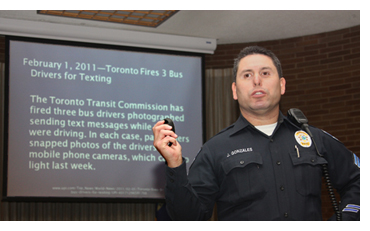
Turn it off and drive
Officers bring 'no texting and driving' message to ITD
Take attention away from driving long enough to scan a text message or search for a contact and you may find that your motor vehicle has traveled more than three city blocks with no one looking at the road ahead.
Sgt. John Gonzales and officer Will Stoy, with the Meridian Police Department, recently talked about the dangers of texting while driving at a Headquarters presentation sponsored by the ITD Safety Committee .
 “Texting while driving is 30 times more dangerous than drinking and driving,” Gonzales said. “Texting is distracted driving, and distracted driving is dangerous.”
“Texting while driving is 30 times more dangerous than drinking and driving,” Gonzales said. “Texting is distracted driving, and distracted driving is dangerous.”
From 2007 to 2009, distracted driving led to 193 fatal crashes that killed 211 people in Idaho. At the same time, 1,316 injury crashes caused by distracted driving on the state’s highways left nearly 1,700 people seriously injured.
Approximately two-thirds of the distracted driving crashes occurred while the motor vehicle was traveling in a straight line.
Distracted driving can take on three forms: visual, or taking eyes off the road; manual, removing hands from the wheel; and cognitive, taking your mind off what you are doing.
Stoy said distracted driving is an impairment because of 1) increased mental process required to write a text message, 2) less physical control of a vehicle caused by holding a phone and 3) visual impairment caused by continually looking back and forth between the phone display and the road ahead.
Cell phone use ITD personnel are prohibited from using a cell phone or other messaging device, including hands-free or text messaging operations, for any reason while operating a moving ground vehicle or off-road motorized equipment to perform work duties. Examples include, but are not limited to, automobiles, pickups, trucks, snowplows, cranes, boom trucks, bucket trucks, backhoes, excavators, loaders, motor graders, rollers, tractors of any kind... The only approved communication device is an ITD radio, when required. Drivers on ITD business are required to stop their vehicle at a safe location to use a cell phone or other messaging or electronic device except for two-way radios. |
He indicated that distracted driving can involve trying to follow GPS instructions, working with phone applications, managing social network activities, browsing e-mail and searching through contacts… “any action that takes your mind off the road and traffic.”
Nationwide, 30 states have enacted texting while driving bans, and lawmakers in other states are considering doing likewise. Idaho is among those without a statewide ban, but Sen. John McGee is crafting legislation for possible consideration.
The cities of Meridian and Twin Falls enacted local ordinances banning texting while driving.
Meridian’s fine, including court costs, is $126.50 for a first or second offense. A third offense is treated as a misdemeanor, carrying a possible $300 fine, plus court costs, and a jail sentence. The fine for violating the ban in Twin Falls starts at $50 but can reach $300.
Gonzales said 15 citations have been issued since enactment of the Meridian ordinance in December. He explained the Meridian Police Department’s approach to the texting and driving ordinance is first prevention, then education and finally enforcement.
The officer indicated most texting and driving contacts made and citations given involved adults.
Both Stoy and Gonzales encouraged motorists to set good examples by not texting or using other devices while driving and turning off the phones.
Published 2-11-2011